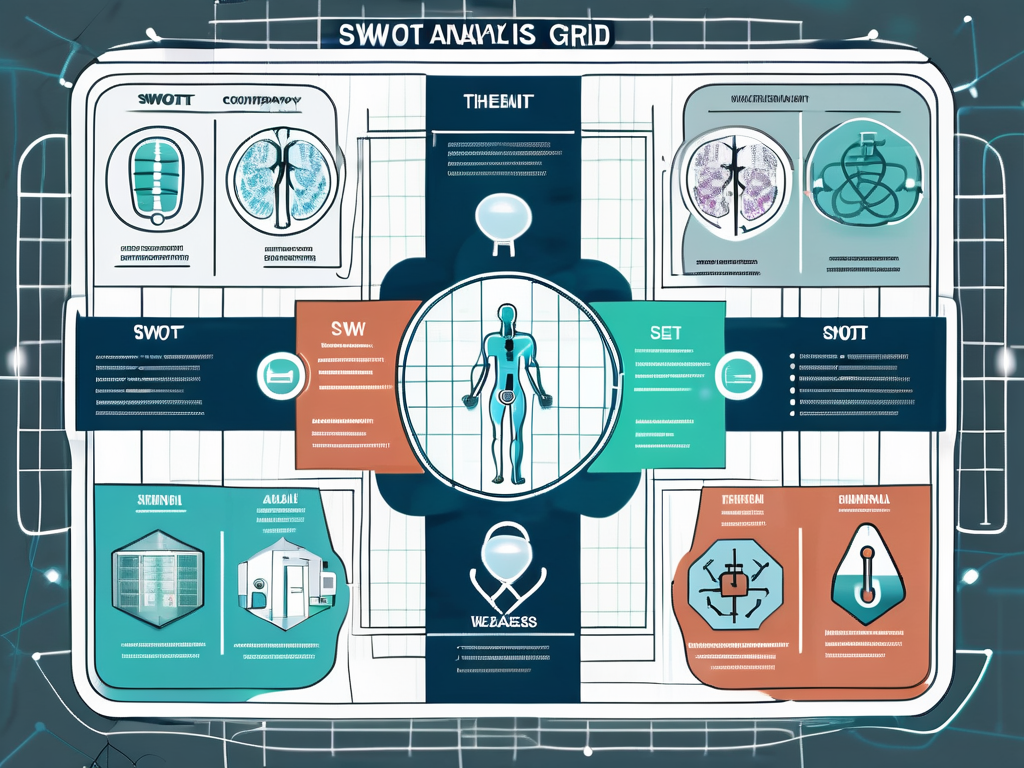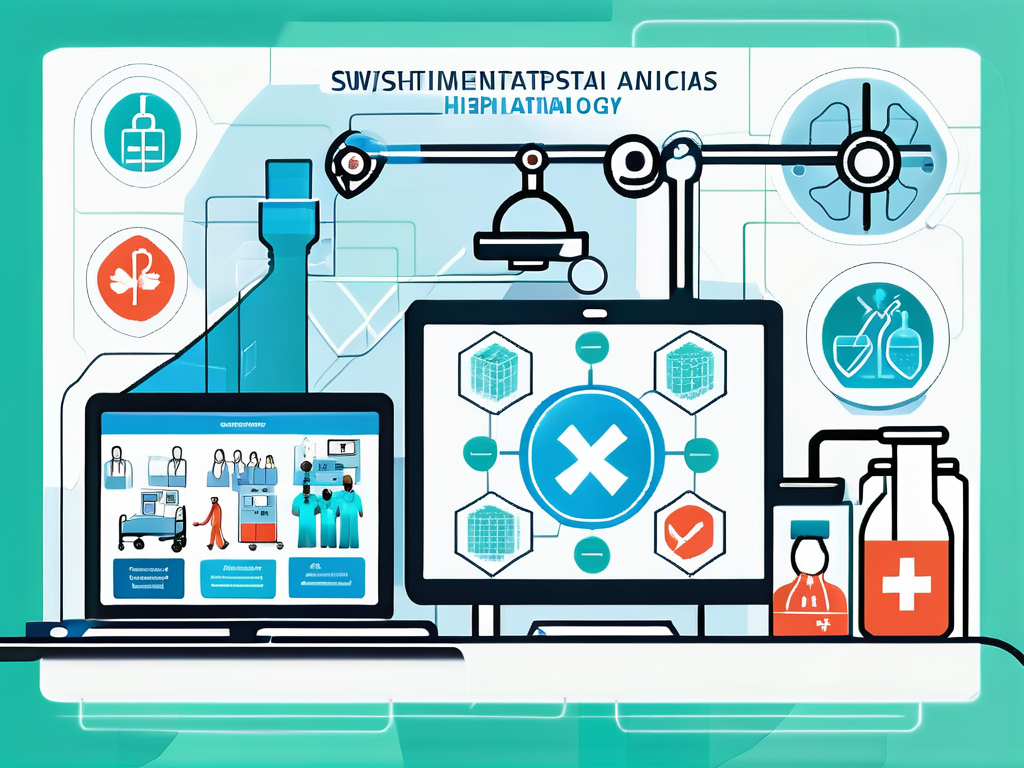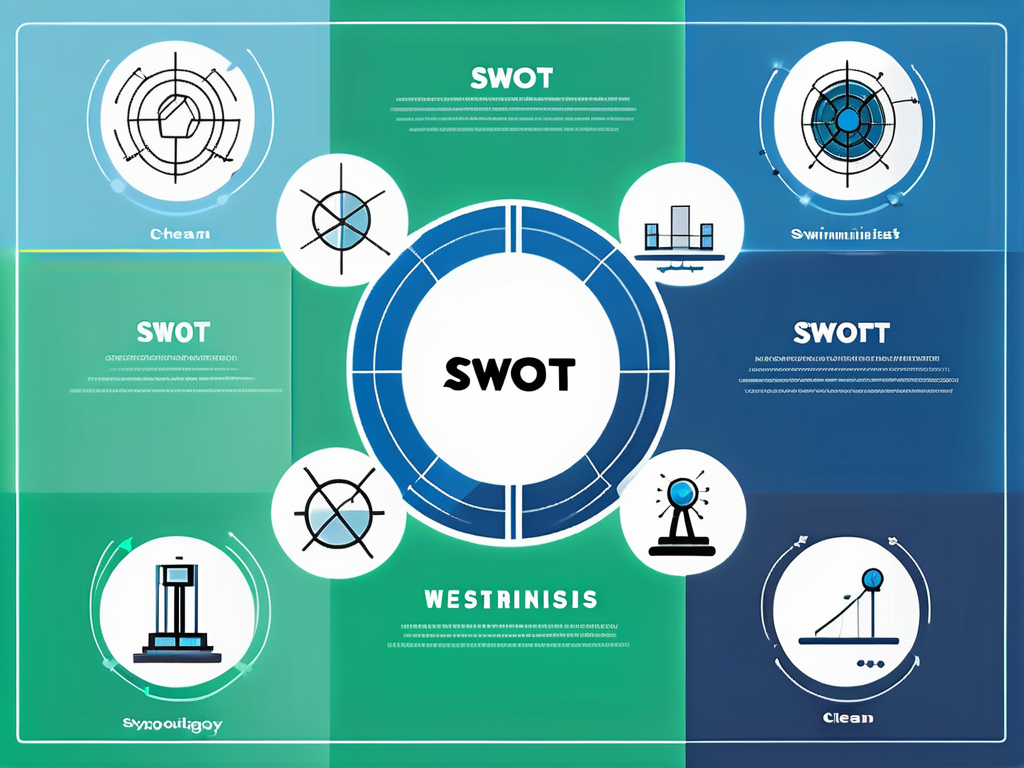In today’s rapidly evolving healthcare industry, decision-making is critical. Whether you are a healthcare professional, an administrator, or a stakeholder, being equipped with the right tools and strategies is essential. One such strategy that has gained significant popularity is SWOT analysis. In this guide, we will demystify SWOT analysis and explore how it can be enhanced using Artificial Intelligence (AI) in the healthcare setting.
Demystifying SWOT Analysis
Before delving into the intricacies of SWOT analysis, it is crucial to understand its basics. SWOT stands for Strengths, Weaknesses, Opportunities, and Threats, making it a comprehensive framework for analyzing internal and external factors in a business or organizational context.
Understanding the Basics of SWOT Analysis
A SWOT analysis involves identifying and evaluating an entity’s strengths and weaknesses, as well as the opportunities and threats it faces. Strengths and weaknesses are internal factors, while opportunities and threats are external factors that can impact success or failure.
When it comes to healthcare, conducting a SWOT analysis can provide unique insights that help shape future strategies.
The Importance of SWOT Analysis in Healthcare
The healthcare industry is constantly evolving, with advancements in technology, changes in legislation, and shifting patient needs. In such a dynamic environment, healthcare organizations need to stay agile and adaptable. This is where SWOT analysis can be a game-changer.
By identifying strengths, weaknesses, opportunities, and threats, healthcare providers can gain a comprehensive understanding of their internal capabilities and the external factors that may impact their success. This awareness is crucial for making informed decisions, strategic planning, and addressing potential challenges.
To further enhance the effectiveness of SWOT analysis, leveraging Artificial Intelligence can unlock a wealth of benefits.
Artificial Intelligence (AI) has revolutionized various industries, and healthcare is no exception. By incorporating AI into SWOT analysis, healthcare organizations can harness the power of data-driven insights and predictive analytics. AI algorithms can analyze vast amounts of patient data, identify patterns, and generate valuable insights that can inform strategic decision-making.
Moreover, AI-powered tools can automate the SWOT analysis process, saving time and resources for healthcare professionals. These tools can quickly gather and analyze data from various sources, providing a comprehensive overview of an organization’s strengths, weaknesses, opportunities, and threats. This efficiency allows healthcare providers to focus on developing effective strategies and delivering high-quality care.
Additionally, AI can assist in identifying emerging opportunities and potential threats in the healthcare landscape. By continuously monitoring industry trends, patient preferences, and regulatory changes, AI algorithms can alert healthcare organizations to new opportunities for growth or potential risks that need to be mitigated. This proactive approach enables healthcare providers to stay ahead of the curve and adapt their strategies accordingly.
In conclusion, SWOT analysis is a valuable tool in the healthcare industry, providing insights that can shape future strategies. By incorporating Artificial Intelligence into the process, healthcare organizations can unlock even greater benefits, including data-driven insights, automation, and proactive identification of opportunities and threats. Embracing this combination of traditional analysis and cutting-edge technology can empower healthcare providers to navigate the ever-changing landscape and deliver optimal care to patients.
Unveiling the Power of SWOT Analysis in Healthcare
Enhancing the traditional SWOT analysis with AI can revolutionize decision-making in healthcare. Let’s explore the key benefits of incorporating AI into SWOT analysis.
Exploring the Benefits of SWOT Analysis with AI
With AI-powered tools, healthcare organizations can gather and analyze vast amounts of data quickly and accurately. This allows for a more comprehensive and nuanced understanding of an organization’s strengths, weaknesses, opportunities, and threats.
Additionally, AI algorithms can identify patterns and trends that may not be immediately apparent to human analysts. This enables healthcare providers to make data-driven decisions and develop strategies that are backed by robust evidence.
Moreover, AI can help in predicting potential future scenarios, allowing organizations to proactively identify and mitigate threats while harnessing opportunities effectively.
How SWOT Analysis Prepares You for Future Challenges
The healthcare landscape is constantly evolving, and organizations need to adapt to stay ahead. By conducting a SWOT analysis, healthcare providers can gain valuable insights into potential challenges on the horizon.
For example, an analysis might identify emerging healthcare technologies that could disrupt traditional practices. Armed with this knowledge, organizations can proactively invest in the necessary infrastructure, partnerships, or upskilling to remain competitive and deliver high-quality care.
When it comes to embracing innovation and meeting the evolving expectations of patients and stakeholders, it is crucial to leverage the expertise of a digital marketing agency focused on healthcare. These specialized agencies can provide guidance on using tools like Google Ads and AI to amplify the impact of SWOT analysis.
Leveraging SWOT Analysis to Identify Opportunities
A SWOT analysis is not only about identifying weaknesses and threats; it also brings opportunities to light. By identifying market gaps or untapped potential, healthcare organizations can position themselves for growth and success.
For instance, a SWOT analysis may reveal that a certain demographic is underserved in a particular geographic area. Armed with this knowledge, healthcare providers can tailor their services and target marketing efforts to meet the unique needs of this population, thereby gaining a competitive edge.
By leveraging the power of AI algorithms, organizations can analyze large sets of data, identify trends, and pinpoint opportunities that might otherwise go unnoticed. This leads to a more comprehensive and targeted approach to seizing opportunities.
Overcoming Limitations with SWOT Analysis
While SWOT analysis offers immense value, it is not without limitations. One such limitation is the potential for bias or subjectivity in the interpretation of data. Additionally, the sheer volume and complexity of data in the healthcare industry can be overwhelming.
However, by integrating AI into the SWOT analysis process, healthcare organizations can overcome these limitations.
AI algorithms offer an objective and unbiased analysis of data, reducing the potential for human error or bias. By automating the analysis process, AI can also sift through large datasets swiftly, uncovering valuable insights that may have been hidden in manual analysis.
Furthermore, it is worth noting that the implementation of AI in SWOT analysis can also have a positive impact on patient care. By harnessing the power of AI, healthcare organizations can identify patterns in patient data that may indicate potential health risks or predict disease progression. This allows healthcare providers to intervene early and provide personalized treatment plans, ultimately improving patient outcomes.
In addition to patient care, AI-powered SWOT analysis can also have a significant impact on healthcare resource management. By analyzing data on resource utilization, AI algorithms can identify areas of inefficiency and recommend strategies for optimization. This can lead to cost savings, improved resource allocation, and ultimately, a more sustainable healthcare system.
Mastering the Art of SWOT Analysis
Key Steps to Perform a SWOT Analysis in Healthcare
Now that we have explored the fundamentals and benefits of SWOT analysis in healthcare, let’s dive into the key steps involved in conducting a successful analysis.
- Define the objective: Start by clearly defining the purpose of your SWOT analysis. This could be anything from improving patient satisfaction to expanding into new markets.
- Gather data: Collect relevant data from internal and external sources. This may include financial statements, market research reports, patient feedback, and competitor analysis.
- Identify strengths and weaknesses: Analyze your organization’s internal capabilities. What are you doing well? What areas can be improved? Consider factors such as infrastructure, human resources, technology, and financial resources.
- Explore opportunities and threats: Examine the external factors that can impact your organization. Are there any emerging trends, regulatory changes, or market shifts that present opportunities or threats? Consider factors such as competition, industry trends, political influences, and economic factors.
- Analyze and prioritize: Once you have identified strengths, weaknesses, opportunities, and threats, it’s time to analyze and prioritize them. Focus on the factors that have the most significant impact on your organization’s goals and objectives.
- Develop strategies: Based on your analysis, develop strategies that leverage your strengths, address weaknesses, seize opportunities, and mitigate threats. Ensure these strategies align with your organization’s long-term vision and goals.
- Monitor and adapt: SWOT analysis is an ongoing process. Regularly monitor internal and external factors, update your analysis when necessary, and adapt your strategies as the healthcare landscape evolves.
Gathering Essential Data for a Successful SWOT Analysis using AI
Gathering accurate and relevant data is crucial for conducting a comprehensive SWOT analysis. AI-powered tools can streamline this process by automatically collecting data from various sources, such as electronic health records, patient feedback systems, and market research databases.
By harnessing the power of AI algorithms, healthcare providers can analyze this data in real-time, uncovering valuable insights and trends. These insights can then be used to inform strategic decision-making and drive organizational success.
Completing the SWOT Categories Effectively
When completing the SWOT categories, it is important to be thorough and specific. Avoid generic statements and strive for granularity.
For example, instead of stating “Technology is a strength,” specify the specific technologies or systems that give your organization a competitive edge. Similarly, when identifying weaknesses, be precise about the areas requiring improvement and consider potential solutions.
Enhancing Decision-Making Through SWOT Analysis
SWOT analysis is a powerful tool for improving decision-making in healthcare. By understanding your organization’s strengths and weaknesses and analyzing external opportunities and threats, you can make informed, data-driven decisions that drive positive outcomes.
Furthermore, integrating AI into the SWOT analysis process can amplify its benefits. AI-powered analytics tools, such as Google Ads, can provide valuable insights into customer behavior, market trends, and competitor strategies. Leveraging such tools can enhance your organization’s strategic decision-making and drive results.
Now, let’s delve deeper into the concept of AI-powered analytics tools. These tools utilize advanced algorithms to analyze vast amounts of data, enabling healthcare providers to gain a deeper understanding of their patients’ needs and preferences. By harnessing the power of AI, healthcare organizations can identify patterns and trends that may have otherwise gone unnoticed, allowing them to tailor their services and improve patient outcomes.
Moreover, AI-powered analytics tools can also assist in identifying potential risks and threats in the healthcare landscape. By continuously monitoring data from various sources, these tools can alert healthcare providers to emerging trends, regulatory changes, or market shifts that may impact their organization. This proactive approach enables healthcare organizations to stay ahead of the curve and adapt their strategies accordingly.
In conclusion, SWOT analysis is a vital tool for healthcare organizations seeking to thrive in today’s dynamic landscape. By incorporating AI into the analysis process, healthcare providers can unlock a deeper level of understanding, identify and capitalize on opportunities, and proactively address challenges. Make sure to leverage the expertise of digital marketing agencies focused on healthcare to fully harness the power of AI and maximize the impact of your SWOT analysis.
Ready to elevate your healthcare organization’s strategic planning with the precision of AI? At Clinic Marketing AI, we understand the intersection of healthcare, marketing, and artificial intelligence like no other. Angelo Rosati, our CEO, brings a wealth of experience and a passion for health tech to the table, ensuring that your clinic doesn’t just grow, but excels. We’re not just a service provider; we’re your partner in transformation. Book a Call with Us today, and let’s embark on a journey to redefine the future of Your Clinic together.





